If we continue waiting for more evidence about omicron, it will already be too late
Understanding exponential growth of infection is absolutely key to responding to and mitigating pandemics

This column is an opinionby Blake Murdoch,a senior research associate with the Health Law Institute at the University of Alberta, andChristopher McCabe,a professor in the University of Alberta's faculty of medicine.For more information aboutCBC's Opinion section, please see theFAQ.
People think fairly linearly, and we like to feel rational by making decisions on the basis of large quantities of data, gathered carefully over time.
It is unintuitive to think exponentially. Yet, understanding exponential growth of infection is absolutely key to responding to and mitigating pandemics. This is because the amount of harm increases so quickly, and the economic and social costs of mitigating that harm rise alongside it.
As the World Health Organization's Dr. Michael Ryan said about COVID responses in March 2020, near the very beginning of this horrible affair, "You must be the first mover If you need to be right before you move you will never win."
Four waves into this pandemic, too many decision makers still have not learned this lesson and struggle to understand the exponential harm of inaction. The jurisdictions that have experienced the most harm are the ones that have waited too long to act.
An appropriate response
Part of the problem is that the precautionary principle is wrongly conflated with panic. These are two entirely different things. Superior public health decisions made with the awareness of exponential growth are almost always made early on in the pattern of evidence especially when we already know what measures will work. However, they are easily misunderstood as a disproportionate response driven by panic, rather than the appropriate, timely and evidence-based responses that they are.
Conversations about omicron are already rife with discussion about how "mild" it is, reflecting the understandable social desire to believe that the pandemic will be ending and that life has to get better. People want to believe omicron is like a common cold, and feel reassured when Dr. Anthony Fauci says omicron is not more severe than delta.
Even if omicron is less severe in the vaccinated and previously-infected communities, its high transmissibility makes the vaccinated population a bridge to the unvaccinated and means we should expect to see another substantial wave of severe disease. If it ends up being less severe, that could be due to better global immunity as much as to a drop in base virulence.
WATCH | Britain sees first omicron variant death:
A faster spreading virus through some combination of transmissibility and immune evasion, which omicron has is almost always far more harmful than a slower-spreading and equivalently more severe one. That's because severity is linear and transmissibility is exponential. Omicron need not be more severe than delta to do more damage.
The "it's mild" narrative ignores inconvenient facts. The current average age of hospitalizations is far lower in omicron's South African epicentre of Gauteng than in the previous delta wave there. Along with increased vaccination rates and immunity acquired through infections, this means we would expect far less severe disease. Nothing screams "it's mild" about GautengCOVID hospitalizations and ICU admissions occurring at a rapid pace.
The data we have suggests omicron infections are doubling about every three days. Recent U.K. data suggests omicron could be doubling there every two to three days, and a leaked public health memo advised the U.K. government to take stringent measures to avoid omicron overwhelming their health system. If left unchecked, a three-day doubling means it could infect almost the entire world in the first quarter of 2022, creating a massive mutation opportunity which would likely extend the pandemic even further.
Crucial turning point
We are now at a crucial turning point in this pandemic. In the last few days, several studies have been released indicating that omicron is good at reinfecting vaccinated or previously infected people. We hope that vaccines will continue to provide protection against severe disease, but don't know how much. Preliminary data from the U.K. Health Security Agency indicates protection from symptomatic infection with omicron may be close to zero for those vaccinated with double AstraZeneca, and less than 40 per cent for those with two shots of Pfizer. The same report indicated that booster doses could increase protection to around 75 per cent. This is bolstered by other research that has shown third shots increase antibodies about 40 times, making them an effective and key policy response to control omicron - but only if we move swiftly.
The time to act was yesterday. Delta already poses a grave risk on its own, and now we face both delta and omicron. Our health care systems are already in a staffing and morale crisis. We need public health measures,particularlyemergency HEPA filtration deployment in accordance with Health Canada's new guidance, N95-style masks for everyone, rapid test kits for families to use over the holidays and boosters for those at risk of severe outcomes.
And please, for the love of god, listen to the epidemiologists.
Do you have a strong opinion that could add insight, illuminate an issue in the news, or change how people think about an issue? We want to hear from you. Here'show to pitch to us.













_(720p).jpg)


 OFFICIAL HD MUSIC VIDEO.jpg)
.jpg)



























































































